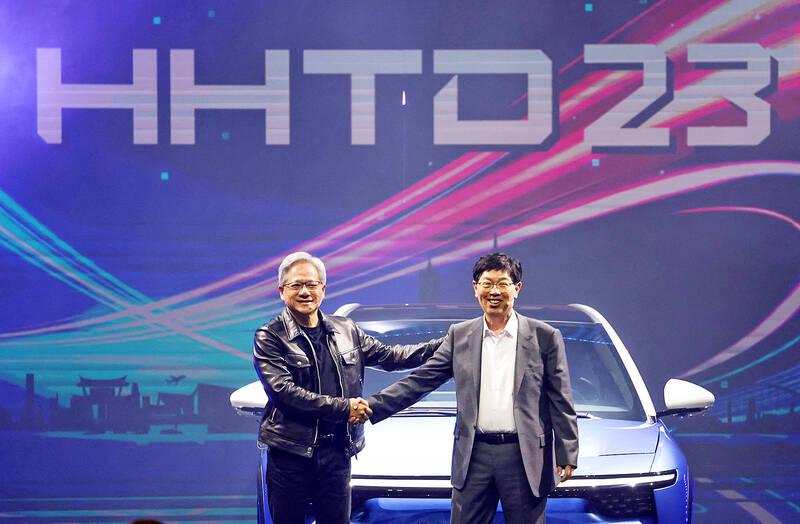Hon Hai Precision Industry Co (鴻海精密) yesterday said it is deepening its partnership with Nvidia Corp by developing next-generation artificial intelligence (AI) platforms and “AI factories” for electric and autonomous vehicles together.
The concepts they are developing could also be applied to industries such as smart manufacturing and robotics, the companies said.
The latest move, announced at the annual Hon Hai Tech Day in Taipei, would help the company realize its electric vehicle (EV) ambitions with a range of solutions using Nvidia’s Drive platform.

Photo: AFP
The companies said that their collaboration on creating “AI factories” would be based on an Nvidia computing infrastructure specially built for processing, refining and transforming vast amounts of data into valuable AI models and tokens.
“Most importantly, Nvidia and Hon Hai are building these factories together. We will be helping the whole industry move much faster into the new AI era,” Hon Hai chairman Young Liu (劉揚偉) said.
“A new type of manufacturing has emerged — the production of intelligence, and the data centers that produce it are AI factories,” Nvidia CEO Jensen Huang (黃仁勳) said. “Hon Hai, the world’s largest manufacturer, has the expertise and scale to build AI factories globally. We are delighted to expand our decade-long partnership with Hon Hai to accelerate the AI industrial revolution.”
Huang said that an AI factory that processes data into intelligence would improve EV software and upgrade entire fleets of vehicles to work more intelligently.
During a question-and-answer session, Young said that Hon Hai would be well-prepared to accept orders from Chinese EV brands once Beijing lifts restrictions that prevent companies from providing vehicle design and manufacturing services on a contract basis.
Hon Hai seeks to expand its global footprint by teaming up with local partners.
“China will relax the outsourcing restrictions sooner or later,” Young said, adding that competition is fierce in China, where about 200 automakers are vying for a piece of the market.
Against that backdrop, Chinese automakers are under heavy pressure and might farm out orders to safeguard their market positions, he said.
In Taiwan, Hon Hai plans to build up capacity to produce 50,000 to 100,000 EVs annually, as it seeks to secure a 10 percent market share with sales of about 400,000 to 450,000 units a year, it said.
The company is in talks with 14 potential customers and has worked on 23 development projects, chief EV strategy officer Jun Seki said.
India and Japan have the potential to become new top EV markets after China, he said.
Hon Hai yesterday unveiled the Model N logistics EV and the mass-production version of its Model B crossover sports utility vehicle (SUV), which it said has been well-received by customers.
The electric Model C SUV would enter volume production next year, as its first customer, Luxgen Motor Co (納智捷), is slated to deliver its N7 model in the first quarter of next year, it said.

MAKING WAVES: China’s maritime militia could become a nontraditional threat in war, clogging up shipping lanes to prevent US or Japanese intervention, a report said About 1,900 Chinese ships flying flags of convenience and fishing vessels that participated in China’s military exercises around Taiwan last month and in January last year have been listed for monitoring, Coast Guard Administration (CGA) Deputy Director-General Hsieh Ching-chin (謝慶欽) said yesterday. Following amendments to the Commercial Port Act (商港法) and the Law of Ships (船舶法) last month, the CGA can designate possible berthing areas or deny ports of call for vessels suspected of loitering around areas where undersea cables can be accessed, Oceans Affairs Council Minister Kuan Bi-ling (管碧玲) said. The list of suspected ships, originally 300, had risen to about

DAREDEVIL: Honnold said it had always been a dream of his to climb Taipei 101, while a Netflix producer said the skyscraper was ‘a real icon of this country’ US climber Alex Honnold yesterday took on Taiwan’s tallest building, becoming the first person to scale Taipei 101 without a rope, harness or safety net. Hundreds of spectators gathered at the base of the 101-story skyscraper to watch Honnold, 40, embark on his daredevil feat, which was also broadcast live on Netflix. Dressed in a red T-shirt and yellow custom-made climbing shoes, Honnold swiftly moved up the southeast face of the glass and steel building. At one point, he stepped onto a platform midway up to wave down at fans and onlookers who were taking photos. People watching from inside

Japan’s strategic alliance with the US would collapse if Tokyo were to turn away from a conflict in Taiwan, Japanese Prime Minister Sanae Takaichi said yesterday, but distanced herself from previous comments that suggested a possible military response in such an event. Takaichi expressed her latest views on a nationally broadcast TV program late on Monday, where an opposition party leader criticized her for igniting tensions with China with the earlier remarks. Ties between Japan and China have sunk to the worst level in years after Takaichi said in November that a hypothetical Chinese attack on Taiwan could bring about a Japanese

The WHO ignored early COVID-19 warnings from Taiwan, US Deputy Secretary of Health and Human Services Jim O’Neill said on Friday, as part of justification for Washington withdrawing from the global health body. US Secretary of State Marco Rubio on Thursday said that the US was pulling out of the UN agency, as it failed to fulfill its responsibilities during the COVID-19 pandemic. The WHO “ignored early COVID warnings from Taiwan in 2019 by pretending Taiwan did not exist, O’Neill wrote on X on Friday, Taiwan time. “It ignored rigorous science and promoted lockdowns.” The US will “continue international coordination on infectious